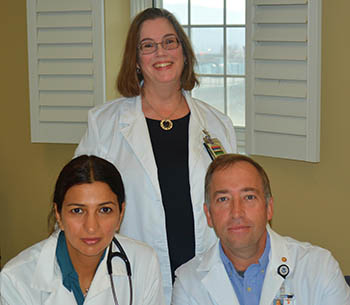
The original Project HAPPEN team members: (left to right) Shikha Vasudeva, MD; Shannon Munro, PhD, NP; Mike Raczynski, RN, MSN, CIC.
SALEM, VA—It’s a frustrating reality of hospital life—the possibility that a patient might develop an illness under care that they did not have when they arrived. Caused by bacteria rather than a virus, hospital-acquired pneumonia is the second most common type of hospital-acquired infection and the leading cause of death from hospital-acquired infections in critically ill patients.
In 2016, Shannon Munro, PhD, APRN, a nurse practitioner researcher at the Salem VAMC, and her colleagues were looking for an intervention that could prevent this sometimes-fatal illness.
“We found that there were a lot of at-risk patients developing HAP, and we wanted to find out why and what we could do to prevent it,” she explained. “My research colleagues and I searched the literature, learning about incidents and risk factors and prevention measures.”
The solution they settled on was a simple one: brushing the patient’s teeth twice a day.
“It does seem like such a simple thing, but most people don’t realize that oral care is missed 70% of time at hospital admissions,” Munro explained. “Germs develop in the mouth and are swallowed or aspirated. Toothbrushing lowers the bacterial burden in the mouth.”
Munro and her team got the Salem VAMC on board with the initiative, which would eventually be given the name Hospital-Acquired Pneumonia Prevention by Engaging Nurses, or Project HAPPEN. Since then, the number of patients developing HAP at the Salem facility who are not on ventilators has dropped 90%.
That decrease directly translates into patients whose lives have been saved. A 2018 study in the American Journal of Infection Control found that nonventilator HAP has an 18.7% mortality rate and that patients who develop it are more than eight times more likely to die from hospitalization.
Now Munro and a team from VA’s Diffusion of Excellence—part of VA’s Innovation Ecosystem, which specializes in scaling high-impact healthcare strategies—are working to bring Project HAPPEN to VA hospitals nationwide.
“What we’re trying to do is knock down barriers for people like Shannon to have their practices scale more readily,” explained Ryan Vega, MD, diffusion of excellence lead.
Diffusion of Excellence uses a Shark Tank-style competition to identify new healthcare initiatives developed by VA employees. Then it works with those employees at a Diffusion of Excellence Base Camp to help guide the most promising innovations to build implementation plans for replication.
“Our operating model helps emerging practices, identifies promising practices to replicate and really breaks down those practices into components so we can better understand which are the best that can be scaled across the [VA] enterprise,” Vega explained.
Project HAPPEN was one of the initiatives to successfully emerge from that process. It’s being employed at 68 VA facilities around the country. Eventually Munro and Vega hope to see the project at all VA hospitals with community living centers (136 hospitals) or medical-surgical units (146 hospitals).
Munro’s role in the expansion process has been as a staff and patient educator—someone who has seen first hand the benefits of toothbrushing.
“Clinical staff need to feel supported and engaged in the whole process, then they’ll hold their staff accountable,” Munro said. “They’ll recognize their high performers and celebrate their successes.”
By working directly with nursing and admin staff, the Diffusion of Excellence team hopes to make this practice stick where top-down mandates don’t.
“Top-down initiatives never stick,” Vega declared. “If it’s not embraced in the clinical work by providers, you won’t get traction. You may get people checking the boxes, but they don’t actually stick.”
Munro and Vega noted that the hospital recruitment into Project HAPPEN has slowed due to coronavirus concerns. Munro said there are currently no studies about coronavirus and oral care, but that she and her team would be discussing it.
Diffusion of Excellence is in conversation with CDC, FDA, HRSA and other agencies to find ways to better track and combat HAP. They also are seeking the next generation of innovative ideas, as well as outside organizations they can partner with to help spread new healthcare practices beyond the walls of VA. Employees or organizations interested in taking part can learn more at va.gov/innovationecosystem.


Probably flossing should happen too in order to be effective.